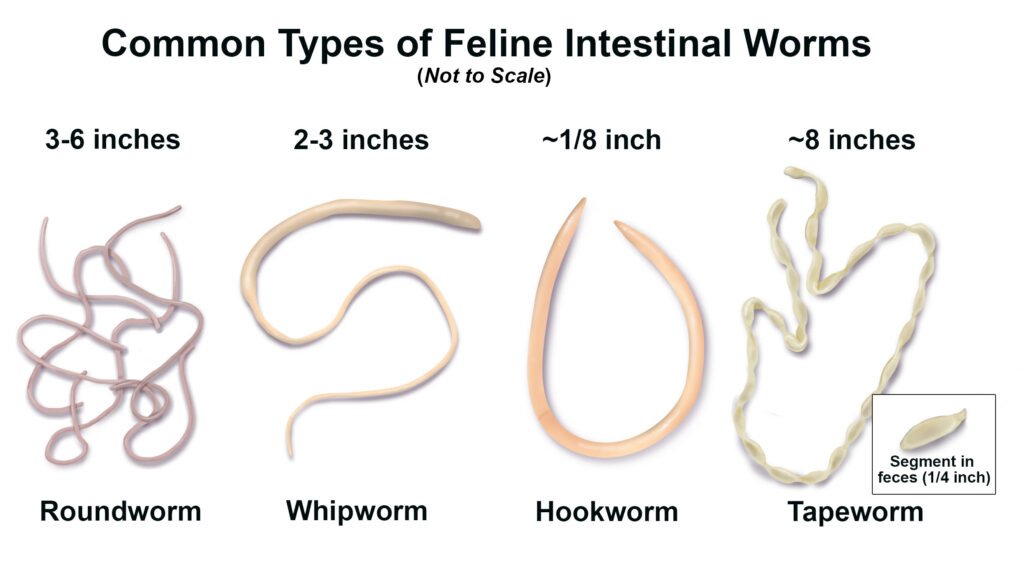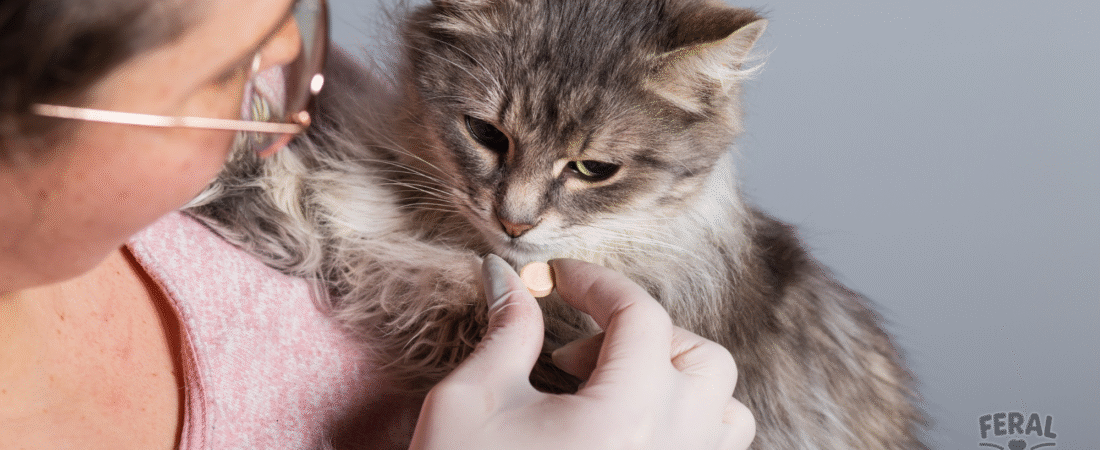Internal parasites—often called “worms”—are among the most common health problems in cats and dogs. They may seem small, but these pests can cause serious health issues ranging from diarrhea and weight loss to anemia and organ damage. Puppies, kittens, and outdoor pets are especially at risk, but even healthy indoor pets can become infected.
This article covers everything you need to know about internal parasites: common types, how pets get them, symptoms, veterinary treatments, holistic support, and prevention.

📌 Common Types of Internal Parasites
- Roundworms:
The most common worm in puppies and kittens. They look like spaghetti strands and live in the intestines, where they steal nutrients. Large infestations can cause a swollen “pot‑belly” look, vomiting worms, or diarrhea. - Hookworms:
Tiny but dangerous worms that attach to the intestinal lining and suck blood. Even small numbers can cause severe anemia, especially in young animals. They can also penetrate skin, so puppies lying on contaminated soil can become infected. - Tapeworms:
Long, flat worms made up of segments that look like grains of rice in stool or around the anus. Tapeworms are most commonly spread when pets accidentally eat a flea or catch prey like mice and birds. - Whipworms (dogs only):
Burrow into the large intestine, causing chronic inflammation. Infected dogs may have intermittent diarrhea (sometimes bloody), weight loss, and straining during bowel movements. - Heartworms:
Spread by mosquitoes, larvae travel through the bloodstream and grow into long worms living in the heart and lungs. This is a life‑threatening disease, most severe in dogs. Cats usually develop fewer worms but can still suffer sudden death. - Protozoa (Giardia & Coccidia):
Microscopic single‑celled parasites. Giardia spreads through contaminated water and causes soft, greasy stools and bloating. Coccidia often affects kittens, causing foul‑smelling diarrhea and dehydration.
🦠 How Do Pets Get Parasites?
- Before Birth or Nursing: Roundworms and hookworms can pass from an infected mother to puppies and kittens during pregnancy or through milk while nursing. This is why almost all young pets are considered infected unless repeatedly dewormed.
- Eating Contaminated Soil or Stool: Parasite eggs live in dirt, grass, and feces for long periods. Pets sniffing, licking, or digging in contaminated areas can swallow the eggs without you ever noticing.
- Flea Infestation: Fleas often carry tapeworm larvae. When cats or dogs groom and swallow just one infected flea, it can complete the cycle and grow into an adult tapeworm.
- Hunting or Eating Prey: Outdoor cats that eat rodents, birds, or reptiles can become infected with worms living in prey animals. Dogs may also catch parasites from scavenging.
- Skin Penetration: Hookworm larvae can penetrate skin — usually entering through bare paw pads or the belly if the pet lies on infected soil.
- Mosquito Bites: Heartworm infection requires no ingestion at all — a single bite from an infected mosquito can transmit larvae directly into a dog’s bloodstream.
- Contaminated Water: Giardia and coccidia thrive in puddles, stagnant water bowls, or shared outdoor water sources.
🚨 Symptoms of Worms & Parasites
- Pot-Bellied Appearance: Kittens and puppies often look bloated despite eating normally, a classic roundworm sign.
- Visible Worms: Worms may be seen in vomit, stool, or segments around the anus.
- Diarrhea/Loose Stool: From coccidia, giardia, or heavy worm infections. Sometimes bloody if hookworms or whipworms are involved.
- Vomiting: Worms irritate the stomach, leading to gagging or vomiting worms.
- Weight Loss & Poor Growth: Parasites steal nutrients, leaving pets thin, malnourished, with dull coats.
- Lethargy: Tiredness from blood loss (hookworms) or nutrition theft (roundworms).
- Pale Gums: Anemia in puppies and kittens from blood‑sucking worms.
- Scooting or Licking Rear: Often caused by tapeworm irritation.
- Coughing (Dogs): May indicate migrating roundworms or early heartworm infection.
🔍 Diagnosis
- Fecal Exam (Microscope): Detects parasite eggs in stool, though some parasites shed eggs intermittently, meaning multiple tests may be needed.
- Blood Test: Required for heartworm diagnosis and sometimes for protozoa.
- PCR (DNA test): Highly sensitive method for detecting certain parasites like giardia.
- Owner Observations: Worms seen physically, changes in stool, or shifts in appetite/behavior often trigger vet checks.
💊 Veterinary Treatment
- Dewormers (broad-spectrum anthelmintics): Kill roundworms, hookworms, whipworms, and some tapeworms. Usually given orally or through injection. Repeated doses are needed to kill adult worms and later hatching larvae.
- Tapeworm Treatment: Specifically requires drugs like praziquantel. Regular dewormers are ineffective against flea tapeworms.
- Antiprotozoals: Drugs like metronidazole or sulfadimethoxine treat coccidia and giardia.
- Heartworm Treatment (Dogs): A multi-step, months-long process involving injections, exercise restriction, and close monitoring. Cats cannot be cured of heartworm, so prevention is crucial.
- Preventative Medications: Monthly heartworm/flea/tick preventatives often double as dewormers for intestinal parasites.
⚠️ Warning: Never give pets human dewormers (or home-use livestock dewormers) without veterinary instructions—they can cause poisoning.
🌿 Holistic & Natural Supports
These won’t replace vet treatment for heavy infestations, but they may help prevent or lower parasite risk when used alongside medical care.
- Pumpkin Seeds: Contain cucurbitacin, which may paralyze worms and help expel them. Crush or grind, add to food (~1 tsp per 10 lbs body weight). Safe for cats and dogs.
- Carrots, Coconut, Zucchini: Fibrous foods that add bulk, helping “sweep” intestines and discourage worms.
- Diatomaceous Earth (Food Grade only): A fine powder made from fossilized algae that may help damage worm exoskeletons. Must be pet-safe food grade and used sparingly under vet advice.
- Probiotics (kefir, unsweetened yogurt): Restore gut balance, reduce harmful bacteria, and strengthen digestion (which parasites thrive in).
- Apple Cider Vinegar (ACV): A few drops in water may make the digestive system less favorable for parasites.
- Herbal Remedies: Wormwood, neem, and clove are traditional antiparasitics—but only in highly regulated, pet-safe formulations from a holistic vet.
- Immune Health First: Strong immunity is the best prevention—nutrient-dense diets, reduced stress, and regular vet visits keep pets resilient.
🏡 Home & Environmental Care
- Daily Cleaning: Scoop poop daily from the yard or litter box—parasite eggs often hatch in 1–2 days.
- Wash Bedding & Toys Weekly: Hot water kills worm eggs and flea larvae.
- Vacuum & Mop: Worm eggs can survive in carpets and floors.
- Flea Control: Critical for preventing tapeworms—no fleas, no tapeworms.
- Safe Water: Provide clean, fresh water and prevent access to puddles or outdoor shared bowls.
- Litterbox Hygiene: Use gloves, wash hands, and sanitize regularly.
🛡️ Prevention
- Puppies/Kittens Deworming Schedule: Every 2 weeks until 12 weeks old, then monthly until 6 months.
- Adult Deworming: Every 3–6 months, or monthly if on regular parasite preventatives.
- Monthly Preventatives: Products like Revolution, Advantage Multi, or Interceptor protect against multiple parasites (fleas, heartworm, intestinal worms).
- Regular Vet Checks: Annual fecal tests should be part of routine care.
- Human Safety: Wash hands, keep children from playing near pet feces, and practice good hygiene to avoid accidental infection.
🌱 Quality of Life & Long-Term Outlook
- With Treatment: Most dogs and cats fully recover from worm infestations. Puppies and kittens bounce back quickly with proper deworming programs.
- With Prevention: Life-long protection is realistic and affordable with routine medication and hygiene.
- With Holistic Support: Pets enjoy improved digestion, stronger immunity, and reduced reinfection risk.
Heartworm prevention is life-saving—it avoids a potentially fatal condition that is extremely difficult to treat once present.
❓ FAQs
1. Can humans catch worms from pets?
Yes. Roundworms and hookworms are zoonotic, meaning they can infect humans. Children are at higher risk due to play in contaminated areas.
2. Are natural remedies enough?
No. For active infestations, only veterinary dewormers are effective enough to clear infections safely. Natural methods are best used for prevention or mild support.
3. My indoor cat doesn’t go outside—can it still get worms?
Yes. Indoor cats may get fleas (tapeworm cycle), eat insects, or be exposed via contaminated shoes and soil brought indoors.
4. What happens if parasites aren’t treated?
Infestations can cause long-term damage: anemia, malnutrition, organ strain, intestinal blockage, or even death in severe cases.
5. How do I know if home remedies are safe?
Always ask your vet, especially with cats—many herbs and “natural” essential oils are toxic to felines. Stick to proven safe options like pumpkin seeds and probiotic foods.
💡 Final Thoughts
Internal parasites don’t just make pets uncomfortable—they can harm their health and threaten your family’s safety. The best defense is a balanced approach:
- Veterinary dewormers for effective treatment.
- Holistic supports like pumpkin seeds and probiotics for prevention.
- Environmental hygiene to stop reinfection.
- Consistent monthly prevention for peace of mind.
✅ Key takeaway: Actively protect your pets with a combination of conventional and holistic strategies, so everyone—pets and people—stays healthy and parasite-free.

